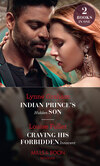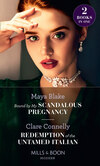Kitabı oku: «Place Of Storms», sayfa 3
The fire was out, a pile of grey ash, and outside the wind had got up. Somewhere one of the broken shutters was banging monotonously each time a gust took it, and Andrea got back into bed feeling chilled and thoroughly out of temper. Between the sound of drips falling into the china basin and the banging shutter she would be lucky if she closed her eyes again for the rest of the night, she thought.
But it was her inner anxieties, more than exterior conditions, that kept her from sleep, she found. No matter how resolutely she tried to exclude him, the scarred face of Blaise Levallier kept intruding on her interior vision. She told herself she was being ridiculous. After all, he had no real power over her. She was free, white and just over twenty-one. The most she had to fear was his anger when he found out he had been deceived and with any luck she would be well away by then. But all the time, a nagging voice somewhere deep inside her kept telling her that it was not going to be that simple.
She sighed, huddling the fleecy softness of the duvet around her. It would be so easy to get involved, she thought, recalling the pang she had felt when Blaise had spoken of losing everyone he cared for in the space of a few hours. She wondered what had happened. Presumably he was referring to his brother’s death, so had the scarring on his face occurred at the same time? It seemed clear there was some connection, and that the subsequent loss of his fiancée was involved in the same web of bitterness.
She closed her eyes, willing her thoughts to be silent, but they would not obey. She found herself speculating about the girl Blaise had been engaged to. Somehow she imagined her small and blonde with a piquant face, like Clare. Was this because in her heart she knew her thoughtless cousin might well have reacted to his damaged face with the same selfish cruelty?
Intuitively, she knew that the visible scars were not the worst that Blaise Levallier carried. Shuttered behind that bleak hostility was a man who had once laughed and loved and expected to be married and raise a family. Now, as a substitute, he had decided on an emotionless relationship with a stranger, and any hopes for the future were pinned on his orphaned nephew. It was not a healthy situation, she told herself.
There was another puzzling aspect to it, too. Clare had told her and he had confirmed that he had spent much of his life abroad. But if he was the heir to this crumbling property, shouldn’t his duty have been to remain here? He had spoken of ‘heritage’, so obviously he was not indifferent to the fact that he was now lord of this particular manor.
She turned over resolutely, burying her face in the pillow. The linen was old, but had been of the finest quality, and it was charmingly scented with lavender. This was a bed for sweet dreams, not disturbing thoughts, she told herself determinedly, in spite of the leaking roof.
But the dreams which came when she at last fell into an uneasy sleep were as troubling as the thoughts had been. She stood in a ruined church, where stars peeped through the broken roof, and grass grew along the aisles. A man stood at the altar alone, endlessly awaiting a bride who did not come, and it was only when she tried to speak to him to comfort him, to run to him and touch his arm, that she realised that she was invisible, calling to him in a voice he could not hear.
When she awoke to find a ray of watery sunlight finding its way through a crack in the faded brocade curtains at the windows, she found her cheeks wet with tears.
She was angrily brushing the betraying drops away when Madame Bresson knocked at the door, and came in bringing a fresh jug of hot water for the washstand. She clucked distressfully at the sight of the bowl on the floor, and burst into a flood of largely incomprehensible explanations from which Andrea gathered that the majority of the bedrooms suffered in the same way during heavy rain, but that Gaston would be despatched to the roof that very morning to carry out some essential patchwork. After assuring herself that Andrea had everything she needed and could find her way downstairs to the dining room, she withdrew.
Andrea washed and dressed hastily in a pair of denim jeans, topped with a ribbed black polo-necked sweater. She looked about her with critical eyes as she went downstairs. The place was clean, certainly, but it was uncared for. There were some magnificent pieces of furniture, but they were not displayed to their best effect, and there were no flowers to be seen anywhere. She gave a little sigh. There might be no money for structural repairs, if Blaise Levallier was heavily committed to this farming co-operative of his, but it would take a very small outlay to make the interior of the chateau far more pleasant. Covers could be mended, she thought, and it might even be possible with care to dye some of the faded curtains. Then she checked herself abruptly. She had to remember why she was here, she told herself vehemently. The state of the chateau, or any of its occupants for that matter, was none of her concern. She would be better occupied in thinking about how she was going to get hold of Clare’s letter.
She was somewhat disconcerted to find Blaise Levallier already seated at the dining table, going through some mail. He did not look any more approachable in the cold light of day, she thought uneasily, as she slid into her place with a murmured greeting.
‘I hope you slept well, mademoiselle.’ The words were civil enough, but the tone of utter indifference in which they were spoken stung Andrea.
‘Not particularly.’ She shook out her table napkin, and helped herself from the basket of warm croissants.
His eyebrows rose. ‘You distress me.’ His voice was sardonic now. ‘May I ask why not?’
‘You may.’ She spread the croissant with jam and bit into it appreciatively. ‘The roof above my room leaks.’
He frowned swiftly. ‘Then you should naturally not have been given such a room. I will speak to Clothilde.’
‘Oh, it isn’t her fault.’ Andrea reached for the coffee pot and filled her cup. ‘She says all the rooms are the same.’
‘Mine is not.’
She gave him a dulcet smile. ‘Naturally,’ she agreed.
He lifted his cup and drank with a meditative air. ‘Then what do you suggest, mademoiselle? I hesitate to put forward the obvious solution …’
She hated herself for her faint, involuntary blush. ‘Naturally,’ she repeated, hanging on like grim death to the dulcet smile. ‘But you could also get the roof mended.’
He shrugged. ‘Gaston does what he can.’
‘So I’ve gathered, but perhaps it’s time you got a professional opinion—unless it’s your intention to have the house crumble about your ears eventually.’ She smiled at him again. ‘You’ll forgive my frankness, but I do have a vested interest in it now.’
That was good, she thought with satisfaction, and it should help allay any suspicions he might have about her motives. If she could convince him that she had given way to force majeure over their marriage, it would make her task very much easier.
‘Yes.’ He studied her for a moment, and she could sense he was puzzled. ‘You are—reconciled to our contract, then?’
‘I don’t seem to have much choice,’ she said, with a slight lift of her shoulders. ‘You’ve made it clear what will happen if I back out, and I couldn’t stand that.’ She gave an exaggerated shudder.
‘So I imagined.’ There was a wry satisfaction in his voice. ‘It would lead to the sort of publicity that neither of us desires, I am sure, apart from the probable injury to your father’s health.’
Andrea, who had just taken a mouthful of coffee, choked and had to replace her cup hastily on its saucer.
‘I—I don’t know what you mean,’ she managed at last.
‘No?’ His look was bleak. ‘I think I make myself perfectly clear, mademoiselle. Your father is an eminent man, and the deterioration in his health has caused a great deal of concern in circles with which I am well acquainted. You could not imagine I would make no enquiries about your background.’
She could not very well reply that they had been counting on it, she thought, her heart hammering unevenly.
‘I suppose not,’ she said at length. ‘That was why you knew you could threaten me, of course. Because of—Daddy.’
‘Hardly threaten, ma mie. I simply pointed out to you what the consequences would be if you failed to fulfil the terms of our agreement, and left the decision to your good sense.’
He was mocking her, she knew, and her resentment hardened.
‘I hope you think your victory is worth the means you had to stoop to to win,’ she said sharply.
‘That remains to be seen.’ He finished the coffee in his cup and stood up. ‘When you have finished breakfast, I thought you might like to ride with me. As you reminded me, you have a vested interest in the estate now, and you may be interested in the changes we are making.’
She was just about to inform him frankly that the only thing she could imagine worse than a morning in his undiluted company was a morning on horseback, when she remembered with dismay that Clare was a keen rider and had probably mentioned this in her letters. She nearly groaned aloud. She could always invent a headache or some other minor ailment, but this might arouse his suspicions, and this was the last thing she wanted. She could ride, but she had none of Clare’s equestrian flair, and she was nervous of horses.
She forced a smile. ‘That would be lovely,’ she agreed. ‘I—I’ll just get a jacket.’
‘Soit.’ He sent her a long look, and for the first time she noticed, inconsequentially, how long his eyelashes were. ‘Shall we say then that we will meet at the main door in—ten minutes’ time?’
As she came downstairs again, Andrea wondered if it would be possible to slip on the stairs and feign a sprained ankle. But as she came round the final curve of the stairs, she saw Blaise Levallier just below her glancing idly through an agricultural catalogue.
He glanced up at the sound of her step. ‘Docile—and punctual,’ he remarked. ‘You will make an admirable wife, ma mie.’
She glared at him in impotent silence. Crossing verbal swords with him would get her nowhere, she reasoned, and all past scores would be paid off anyway when she took her departure and he realised he no longer had the proof he needed of his hold over Clare.
She noted ironically that the stables were in much better condition than the house itself, and commented sweetly on the fact.
‘Perhaps because I find animals of considerably more value than human beings, mademoiselle,’ came the immediate retort, and she subsided angrily.
Her heart sank when Gaston led out the mare that Blaise had designated for her to ride. She was a far cry from faithful old Penelope on whose broad back a much younger Andrea had taken her first quaking lessons. She was a sprightly roan, who sidled and jumped and tossed her head, and her bright eyes spoke of mischief.
‘She needs exercise,’ said her tormentor, already astride his own horse, and looking, Andrea thought bitterly, as if he were part of it.
She looked round for Gaston to help her mount, but he had disappeared back into the stables, so she had to lead the reluctant Delphine over to an ancient mounting block and get herself somehow into the saddle. It was not a polished performance, but at least she found herself on the mare’s back, instead of spreadeagled on the ground when it was completed. So far, so good, she thought, her sense of humour aroused by the sheer absurdity of the situation.
If I break my neck, at least it will be one way out of this mess, she told herself philosophically.
But before they had been out for very long, Andrea knew that it was a very different part of her anatomy that was going to suffer. Apart from that, Delphine was proving the handful she had feared and more. Clare had always said that horses could sense who had the mastery, and it was clear that the mare had written her off as an easy touch. She began to take liberties almost as soon as they were out of the stable yard, refusing to respond to Andrea’s rather tentative pressure on the reins with a toss of her head, and even swinging aside to eat the grass from the verges at the side of the track. The moment of truth came when a large bird flew out of the hedge immediately in front of her, and she squealed with indignation and reared up, nearly unseating Andrea in the process. Humiliatingly but inevitably, Blaise Levallier was there, grabbing the reins and soothing the mare, at the same time forcing her to compliance.
‘Thank you.’ Andrea knew her face was crimson.
‘It is nothing.’ He gave her a narrow look. ‘Perhaps it was a mistake asking you to ride so soon. You must still be tired after your journey—and your sleepless night.’
Now why didn’t I think of that? Andrea asked herself in exasperation. Aloud she said, ‘Probably,’ in a wooden voice.
She took a firm grip on herself and the reins after that, determined to cope better. Certainly, in spite of everything, there was a great deal to enjoy. The air seemed to sparkle after the night’s rain, and the views as they continued to climb were breathtaking. Away in the distance she could glimpse the flattened cones of the puys, the dead volcanic mountains of Auvergne, while around them the trees still wore the last remnants of their autumn glory before the stark onset of winter.
Andrea felt so exhilarated that when they eventually reached a level, grassy stretch of ground she forgot to be nervous when the horses broke into a canter, and then a gallop. Delphine was no longer a monster, fixed on her undoing, but a lovely creature, fluid of bone and muscle, who merely wanted to share her pleasure in her own swift eagerness.
When they reined in, Andrea saw that from this vantage point it was possible to look down on the village and the chateau. Seen from above, it had an even more forlorn look, and Andrea stole a sideways look at her companion to see his reaction. The scarred side of his face was hidden from her, but his expression was bleak and brooding and she did not dare venture a remark.
At last, when she had begun to think he had forgotten her presence, he said ‘Allons!’ in an impatient tone, and they turned the horses and rode on.
The black mood that possessed him persisted as they toured the vineyards, and looked at the new bottling plant which had been installed. Andrea, somewhat to her own surprise, found she was genuinely interested in what was being achieved, and it was frustrating to have her questions answered in monosyllables.
At last she could hold her tongue no longer.
‘This ride was your idea, monsieur,’ she reminded him acidly. ‘If you want me to learn about the estate, you need to improve your teaching technique.’
The look he sent her was chilling, but he made no response. She was not altogether surprised, however, when she found they were on their way back to the chateau.
‘Here endeth the first lesson,’ she observed flippantly.
This time he did reply, and his voice was icy with rage. ‘It may all seem a joke to you, mademoiselle, from your secure English background, but to me and many others in this village, it is life and death. Do you know how many villages there are in France where old people sit in their houses alone, because their children have left—gone to the cities to find work? Do you even care? I doubt it. But I care. And I care too that my home—the house which my family has occupied for hundreds of years—is falling into a ruin about me. Do you imagine that I would have permitted this neglect? Regard it well, mademoiselle. That is what hate can do, and spite and revenge. It is not pretty, hein?’
‘Whose hate, monsieur?’
‘My father’s, mademoiselle. My younger brother was his favourite. He could not forgive me for being the elder and his heir. I could do nothing right—nothing that would please him, except absent myself. He could have stopped the rot then, if he had wished, but he did not wish. I do not think he cared if there was one stone standing upon another when I came into my inheritance. Every last franc was devoted to Jean-Paul, and to our plantation Belle Rivière.’
‘Your brother ran the plantation?’
‘Oui. It was his part of the inheritance. God knows I never grudged it to him. But there were problems. Several bad seasons—hurricanes, pests which destroyed the crop. At last my father ordered me to go there and put things right. It would have taken a miracle. By the time I arrived, Jean-Paul had speculated trying to recoup some his losses, and was facing ruin.’
He stopped abruptly, as if sensing her tension. The anger and bitterness died from his face as if a slate had been wiped clean.
‘But I am boring you, mademoiselle, with our sordid family squabbles. My father has been dead for two years, God rest his soul, and Jean-Paul and his wife are also at peace now. I am left to salvage what I can and make some kind of life for myself and Philippe.’
She moistened her dry lips, appalled at what he had let her see.
‘And Belle Rivière? What has happened to that?’
‘The house has gone,’ he said briefly. ‘It was—burned to the ground a year ago. The land is now leased to the government.’
Something warned her that now was not the time to probe any further. She stole a glance at him and saw that the scar was standing out livid against his tan.
Gaston was waiting to take the horses when they rode into the yard. The ground suddenly looked a long way down, Andrea thought wearily as she eased her aching rear. She felt agonisingly stiff, and was afraid her legs might give way under her through sheer reaction when she dismounted.
‘Permit me.’ Blaise Levallier appeared at her side. Gratefully, she freed her feet from the stirrups and allowed herself to slide from Delphine’s back into his waiting arms. Just for a moment she felt the brush of his warm body against hers, and knew an insane urge to press herself against him, savouring the intimate smell of his sweat.
As her feet touched the ground, she pulled herself away, her face flaming as if he could guess her wanton thoughts, and stumbled slightly.
‘Take care.’ His voice was courteous but impersonal. ‘If you ask Clothilde, she will prepare a hot bath for you. I will see you at dinner.’
He gave her a brief formal nod, before turning and striding away.
Andrea had to force herself not to turn and watch him go. She felt confused and disturbed by this sudden turbulence in her emotions. I hate him, she told herself almost desperately. I’ve got to hate him. And I must never let him touch me again.
CHAPTER THREE
ANDREA leaned her head against a folded towel, placed strategically over the high back of the huge old-fashioned bath, and closed her eyes with a sigh of relief.
The bathroom to which Madame Bresson had led her was next door to the room containing the massive throne-like lavatory which had reduced her to irreverent giggles the previous evening. It was a chilly apartment, its walls hung with large antique embossed tiles in an attractive scroll pattern. The bath, supported solidly on four large claw feet, stood against one wall, its brass taps gleaming. The wall above was festooned with a motley collection of elderly pipework, which emitted strange groaning noises when the taps were turned on.
Observing the care with which Madame had performed this operation, Andrea surmised that the chateau’s plumbing probably possessed a temperament all its own. But she had nothing to complain of in the actual temperature of the water, and the surroundings could be made less Spartan, she thought, mentally boxing in the pipes, and adding a rug to the chill of the tiled floor.
She moved her bruised legs in the cooling water, wincing slightly as she did so. She might be lucky enough to avoid total paralysis, she thought ruefully, but she was going to be very, very stiff. It was to be hoped that she wouldn’t find it necessary to run away during the next twenty-four hours, because even quite gentle exercise was probably going to be beyond her.
But she had to admit that her morning in the fresh air had done her good. She was really looking forward to the lunch that Madame Bresson had promised would be served as soon as she was ready.
And after lunch she was presumably free to do as she pleased. Some time she would have to write to Clare, but as yet she had little to report in the way of good news or even progress. Perhaps the letter could be delayed until things became more positive, and she would use the time instead to explore the chateau a little.
It had occurred to her that if Blaise Levallier was managing the co-operative he must have an office of some description, probably in the chateau itself, and that this would be the most obvious place for him to keep his personal correspondence including, presumably, Clare’s letter. That was the place she would begin her search. The thought filled her with distaste and she had to remind herself forcibly of the equally distasteful methods Blaise had himself employed to try and force her cousin into marriage.
It was useless to pretend that she had not been shocked into a certain sympathy for him by the morning’s revelations. Looking back on the happiness of her own childhood, it seemed incredible that such bitter hostility could exist in a family. It did much to explain the cynical lines that marked his mouth, and the cold ruthlessness he displayed in his dealings with Clare. Yet she could not doubt his affection for his dead brother. There had been no tinge of censure in his references to the problems Jean-Paul had experienced in running the plantation, only regret. His father’s favouritism had not had the power to sour that relationship at least. It was clear there was a connection between the loss of the plantation and Jean-Paul’s death, and that there was also a link between this tragedy and the scarring of Blaise’s face.
She got carefully out of the bath and began to towel herself dry. She must not get involved, she thought, with a sense of desperation. She would not be here for much longer, and when she left, she wanted to be able to turn her back on St Jean des Roches and its master without a second thought or trace of regret. And if a warning inner voice murmured that it might already be too late, she closed her ears deliberately.
Madame Bresson had taken her jeans and sweater to launder, so Andrea changed into a slim-fitting skirt in golden tweed, topped by a dark green woollen shirt, and pinned up her chestnut hair into a neat French pleat.
She lunched on thick home-made broth, savoury with herbs and vegetables, ending her meal with fresh fruit from the chateau’s own orchards and local cheese. She was just finishing her coffee when Madame Bresson came to clear the table.
‘No, you must let me help you. You have quite enough to do.’ Andrea got up gingerly and began to load her dishes on to the tray Madame had brought in spite of the housekeeper’s protests. Then she carried the tray to the kitchen. After all, she told herself in justification, if she was really going to be the mistress here, she would be taking over some of the household duties, and her independent spirit rebelled at being waited on.
The kitchen was a large cheerful room with an enormous glowing range, which also provided hot water as well as cooking facilities. In the middle of the room was a large wooden table with a well-scrubbed top, and an array of fearsome-looking knives to hand. Strings of onions and garlic hung from hooks round the walls, and a huge built-in dresser supported an assortment of copper and cast iron utensils. Andrea enjoyed cooking, although she had never embarked on a Cordon Bleu course as Clare had done for a brief period. She thought that once the vagaries of the range had been mastered, any woman could revel in preparing meals in these homely surroundings.
Madame Bresson seemed not to resent her presence in the slightest, but showed a positive eagerness to open the china cupboards and disclose the secrets of the larder and the wine cellar. She grieved openly over the fact that the chateau was not supplied with electricity and Andrea learned, without any real surprise, that this had been one of the decisions of ‘Monsieur le père de Monseigneur’. She would have loved to know more, but Madame became so tight-lipped at the first of her tentative questions that she desisted.
When she inquired whether anyone would mind if she looked round the chateau, Madame looked a little blank, but she cheered visibly when Andrea assured her, feeling wretchedly guilty, that she did not require a guide, but would be quite happy to look about on her own. Her guilt increased when a large bunch of keys was thrust trustingly into her hands with a beaming smile from the housekeeper.
As she turned to leave, her foot struck something lying on the flagged floor. She bent to retrieve it, and saw to her surprise it was an intricately carved bobbin, the type used in lacemaking.
‘Whose is this?’ She turned to Madame Bresson, the bobbin extended on her palm.
Madame gave a little cry and slipped the bobbin into her capacious apron pocket, profuse in her thanks. Andrea was intrigued.
‘Do you make lace, madame?’ she asked.
Madame nodded proudly. The lace of Auvergne was justly famous—an ancient tradition passed down from mother to daughter for generations. But hélas, there were no daughters for her to pass on her skills to, so Monseigneur was to arrange that she should teach some of the young girls in the village. When Monseigneur was married, she added rather anxiously, he had promised she would have more time to spare for this.
Andrea smothered a smile, guessing this was why Madame had been so ready to introduce her to the inner workings of the establishment.
‘Perhaps you’ll show me some of your lace when you have time,’ she said gently. If she could do so without offending the housekeeper, she thought she might buy something from her—a collar perhaps, or a shawl to take away with her, as a souvenir of what surely would be the strangest few days of her life. It would be a safer reminder than the haunted look in a man’s eyes, and the painful memory of the response even his slightest touch could kindle.
Two hours later she was ready to weep with frustration and annoyance. She had explored all the habitable portions of the chateau, tiptoeing through quiet rooms shrouded in dust covers, along winding corridors where pictures of long-dead Levalliers gazed down haughtily on her intrusion, and up and down staircases until her mistreated muscles screamed for mercy. The only room she had hesitated to enter was the bedroom she knew to be Blaise Levallier’s. After all, her exploration of the chateau could be attributed to simple feminine curiosity, and an interest in historical houses. But she could think of no convincing reason for being discovered in his bedroom—except one which could invite consequences she did not care to contemplate.
She had developed a slight headache and her throat and nasal passages felt full of dust. Fresh air was what she needed, she thought, dispiritedly shrugging herself into her brown leather driving coat. Something to blow the cobwebs away, literally as well as figuratively, and give her a clear perspective on things. She was beginning to wonder if it wouldn’t be best to cut her losses and get out. After all, Clare’s own wedding was not too long away, and surely it might be possible to fend Blaise Levallier off until then, and she was lost to him for ever. At the moment she was simply searching for a needle in a haystack. Clare had been a fool, but was she herself any less harebrained for setting out on this wild goose chase? Why couldn’t Blaise have been the pompous overbearing oaf she had visualised? There would have been a kind of malicious pleasure in leading someone like that up any number of garden paths. She might even have been tempted to flirt with him. But with Blaise, she felt that all the initiative had been taken out of her hands, and that in some odd way it was he who was dictating the course of events.
She shivered a little as she stepped out of the big main door into the fading afternoon sunlight, thrusting her hands into the pockets of her coat. She supposed that the chateau possessed a garden of sorts, but if it was as neglected as the building, it would probably be like hacking one’s way through the jungle. She paused in the middle of the courtyard, looking moodily around her. A sudden feeling of intense irritation came over her and she bent, dragging out a handful of weed and flinging it with more strength than accuracy in the direction of the gatehouse. The muddy bundle thudded against one of the lower windows and slid sadly downwards to rest on the sill, and a matter of seconds later Andrea heard one of the upper windows being opened. Too late she remembered the face she thought she had glimpsed on her arrival, and a hand flew to her mouth in dismay.
There was indeed a face, rather a nice one with a beard and a pair of rimless glasses, gazing down at her with pained astonishment.
‘Pardonnez-moi, mademoiselle. Puis-je vous aider?’ The words might be French, she realised hysterically, but the accent was unmistakably English.
‘I—I’m awfully sorry,’ she said. ‘I—I didn’t realise anyone lived there. No one mentioned you, you see.’
‘You’re English too!’ The look of pained astonishment gave way to a beaming smile. ‘I say, what a coincidence. Are you a tourist? You’re rather off the beaten track here, you know. This isn’t one of the show places.’
‘No.’ Andrea turned and looked at the chateau, narrowing her eyes against the sun. ‘But it could be lovely,’ she added, feeling like a mother rushing to defend an ugly child.
Ücretsiz ön izlemeyi tamamladınız.


















